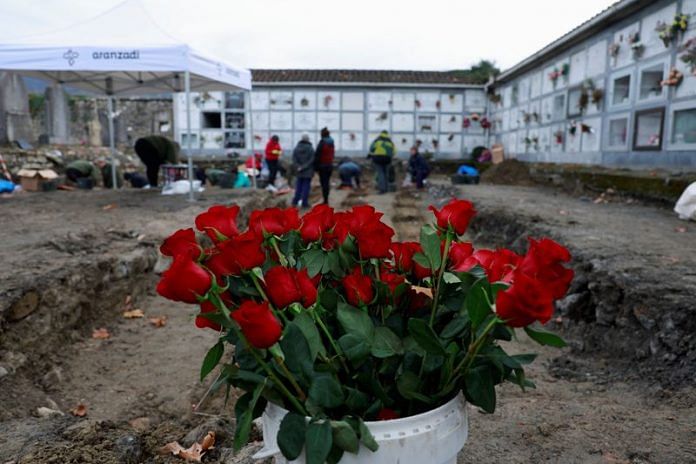By Vincent West
ORDUNA, Spain (Reuters) – Forensic archaeologists have exhumed 53 bodies from shallow graves in the Basque town of Orduna that were dug in 1941, as part of a process of healing the country’s wounds from the Franco dictatorship era.
The investigators will try to identify the remains and return them to relatives so that they can be formally buried, Spanish pathologist Francisco Etxeberria told Reuters on Sunday.
More than 500,000 people were killed during the 1936-1939 Spanish civil war. Historians estimate more than 100,000 people remain missing, many in unmarked mass graves.
The leftist coalition government approved a bill in 2020 to finance exhumations from the unmarked graves as part of a wider effort to find out the truth about the dictatorship’s crimes and heal wounds still open four decades after Franco’s death.
Naiara Garmendia said she understood her family, especially her late grandfather, better after finding out what had happened in the early 1940s to her great-grandfather, Bernardo Rodriguez, a UGT union member from Extremadura, who died in Orduna.
“He can’t be here, he doesn’t have this peace, he won’t know where his father was. But in some way, we can give it to him,” she told Reuters about her late grandfather.
The historical documentation on the graves and testimony suggest that the human remains belong to prisoners who died between February and June 1941 at the Central Prison of Orduna, the Basque regional government said in a statement.
They estimate that at least 225 people died in what was first a concentration camp during the civil war between 1937 and 1939, then a prison between 1939 and 1941.
Etxeberria explained these were republican prisoners who were jailed in terrible conditions under Franco’s regime.
“They died of hunger, lack of clothing, sometimes from diseases such as tuberculosis,” he said.
“We are dealing with victims of Franco’s repression.”
A team of forensics experts will gather the remains buried at the local cemetery, near the old prison, and will send them to laboratories for DNA tests.
Relatives will receive the remains once they have been identified.
This exhumation is part of Gogora (Remembrance), the Basque Government’s “Search for missing persons from the Civil War” programme, in conjunction with the Aranzadi Science Society and collaboration from Orduna’s local government.
(Reporting by Vincent West, Writing by Elena Rodriguez and Inti Landauro, Editing by Nick Macfie)
Disclaimer: This report is auto generated from the Reuters news service. ThePrint holds no responsibilty for its content.



